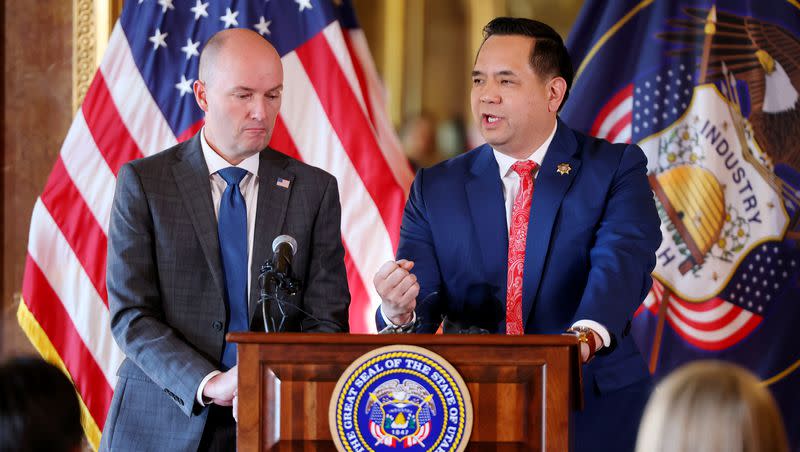NetChoice challenges Utah Social Media Regulation Act in lawsuit

- Oops!Something went wrong.Please try again later.
Tech industry group NetChoice filed a lawsuit in U.S. District Court for the District of Utah on Monday, challenging the Utah Social Media Regulation Act.
The Utah Social Media Regulation Act is set to go into effect March 1, 2024. It would require social media companies to allow parents or guardians full access to their child’s account, create an overnight curfew (between 10:30 p.m. and 6:30 a.m.) and prohibit companies from collecting a child’s data.
The suit, obtained by the Deseret News, named Utah Attorney General Sean Reyes and Director of the Division of Consumer Protection of the Utah Department of Commerce Katherine Hass as defendants. It questioned the constitutionality of the regulations set by the act and seeks to prevent it from going into effect.
Related
A statement from the Utah Attorney General’s office given to the Deseret News said, “The State of Utah is reviewing the lawsuit but remains intently focused on the goal of this legislation: Protecting young people from negative and harmful effects of social media use.”
Describing the act as “an unconstitutional attempt to regulate both minors’ and adults’ access to — and ability to engage in — protected expression,” the suit argued that components of the act violates the First Amendment and the due process clause of the 14th Amendment.
“The act restricts who can express themselves, what can be said, and when and how speech on covered websites can occur, down to the very hours of the day minors can use covered websites,” the suit said.
The suit claimed that the curfew imposed by the Utah Social Media Regulation Act had significant consequences. “The effect of this blackout cannot be overstated,” the suit said.
“As just a few examples, minors will be unable to see social media posts from candidates for elected office, developing news covered by citizen journalists on the other side of the world, or watch homework help videos at times deemed impermissible by the state,” the suit claimed, during the time of the curfew.
“This court can and should exercise its equitable power to enter a declaration that the entire act is unconstitutional and otherwise unlawful,” the suit argued.
In a press release, Chris Marchese, director of the NetChoice Litigation Center, said “With NetChoice v. Reyes, we are fighting to ensure that all Utahns can embrace digital tools without the forceful clutch of government control. Now that these tools are prominent in our lives and important for our economy, young people should learn how to harness their power while developing healthy and safe habits.”
NetChoice also filed an initial complaint on Sept. 22, 2021, naming Texas Attorney General Ken Paxton as a defendant. The suit was in relation to HB20, which prohibited social media platforms from “censuring users based on viewpoint,” The Texan reported. The U.S. Supreme Court has the case in its docket.
Related
After NetChoice sued the Arkansas Attorney General, Judge Timothy Brooks of the U.S. District Court for the Western District of Arkansas ruled in favor of NetChoice. The ruling prevented an Arkansas law that required parental consent for minors on many social media websites from going into effect, Politico reported.
The Utah Social Media Regulation Act
SB152 and HB311, which were both passed by the Utah Legislature, comprise the Utah Social Media Regulation Act.
The Senate bill was sponsored by Sen. Mike McKell, R-Spanish Fork, and the House bill was sponsored by Rep. Jordan Teuscher, R-South Jordan.
“I compare social media to something like tobacco because it has a catastrophic impact, and the impact that we see is diminished mental health, and it’s a huge problem,” Teuscher previously told the Deseret News.
According to the Utah government website, the act would require social media companies to verify the age of a Utah user who opens up a social media account or uses one, block minors’ accounts from appearing in search results, create a curfew from 10:30 p.m. to 6:30 a.m. and allow a parent or guardian to have access to a minor’s account.
It would also make it so a parent or guardian gives consent for Utah minor users of social media and would “protect minor accounts from unapproved direct messaging.”
Social media companies would not be permitted to collect minor’s data and prevent them from targeting minor’s accounts for advertising. Social media companies would also be prohibited from targeting “minor’s social media accounts with addictive designs or features.”
The Utah Social Media Regulation Act would designate the Utah Division of Consumer Protection as the group that would investigate any violations and impose fines and civil penalties up to $2,500 for each violation.
“These are first of their kind bills in the United States. And that’s huge that Utah is leading out on this effort,” Gov. Spencer Cox said. “We have lots of states that are interested and I know we’re all having conversations with other governors, other legislators and other states. I suspect that you will see lots of bills like these moving forward.”

